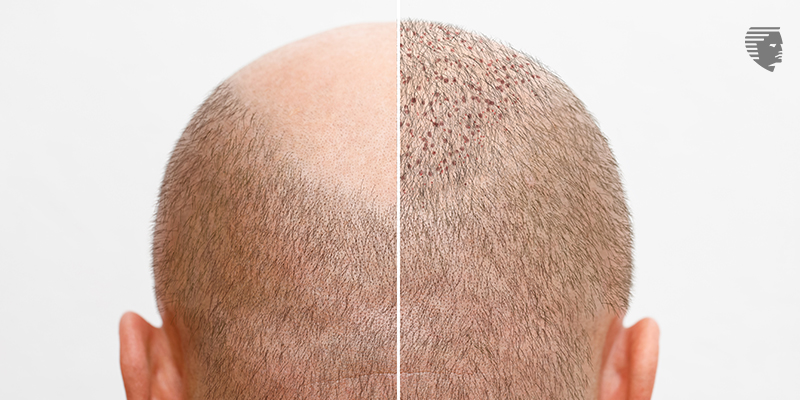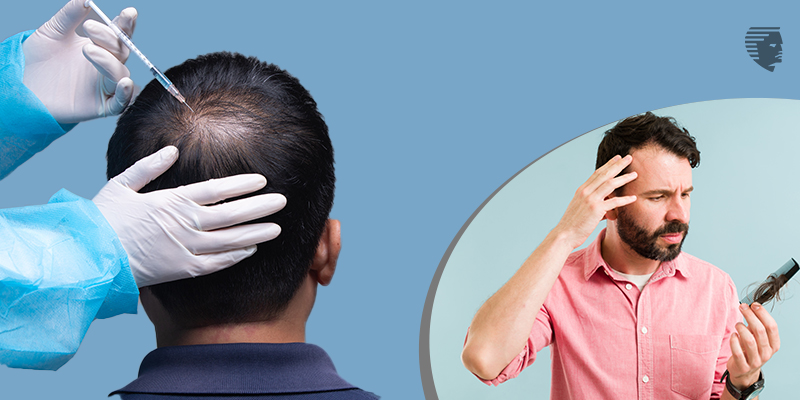
ADVANCED HAIR STUDIO
Decoding the Effectiveness of Hair Loss Treatments
- 11 April 2024
- 4 min. read
Causes of Hair Loss
Both men and women can face hair loss, a prevalent condition. The medical term for hair loss, Alopecia, has numerous reasons. Some of the most typical reasons for hair loss include:Genetics
One of the most usual causes of hair loss is genetics. A genetic condition known as male- and female-pattern baldness can cause hair loss in particular head regions.Hormonal Changes
Changes in hormone levels can also affect hair loss. Due to changes in hormone levels, women may suffer hair loss during pregnancy or menopause.Medical Issues
Conditions, including thyroid illness and autoimmune disorders, can bring on hair loss. Sometimes the medication used to treat these issues have hair loss as a side effect.Stress
Telogen effluvium, a type of hair loss, can be brought on by high stress. Hair follicles in this condition go into a resting period, which results in more hair falling out.Nutritional Inadequacy
Hair loss can also be attributed to a deficiency in essential nutrients like selenium, vitamin D, and iron.Treatments and Hairstyles
Hair follicle damage and loss can be caused by particular hairstyles and hair products like chemical straightening and coloring.Genetics, hormonal shifts, medical conditions, stress, nutritional deficiencies, and specific hairstyles and treatments are a few factors that can cause hair loss. Determining the underlying reason for hair loss is crucial to create a successful treatment strategy and halting further hair loss. A hair doctor can identify the root of hair loss and prescribe the best treatment.
Types of Hair Loss Treatments

Laser Treatment
Low red or near-infrared radiation is applied to the scalp during low-level laser treatment. (LLLT). This treatment may encourage new hair development by stimulating the hair follicles and surging blood flow to the head.Hair Transplant
Small hair pieces are removed from the sides or back of the head and placed into bald or thinning areas during the hair transplant procedure. It is a long-term hair loss treatment, but depending on how much hair is lost, it might be costly and take several sessions.Hair Extensions and Wigs
Those with significant hair loss have a non-surgical alternative in the form of hairpieces and extensions. To fit any person's head and hair they are available in various designs, hues, and materials to fit any person's head and hair.Lifestyle Changes
Reducing stress, improving nutrition, and getting enough sleep are a few lifestyle adjustments that can help stop or slow down hair loss. The general condition and appearance of the hair can be enhanced by leading a healthy lifestyle.With modern technology getting better every day, there are numerous hair fall treatments accessible. It's crucial to review your choices with a medical expert and pick a course of action suitable for your particular type of hair loss and general state of health.
Research Studies on Hair Loss Treatments
Many ways to address hair loss include medications, topical solutions, and surgical procedures. However, in pursuit of finding better, the development of novel treatments for hair loss was the subject of multiple pieces of research.- Researchers at the Department of Stem Cell and Regenerative Biology discovered the ability to create mature, completely functional rodent hair follicles in vitro. In 23 days, the "hair follicle organoids" generated hair shafts that developed to a length of about 3 millimeters.
- Finasteride, spironolactone, and minoxidil can be used to address hair loss. Finasteride treats male-pattern hair loss because it inhibits androgen action. Spironolactone treats female-pattern hair loss because it is a less effective androgen activity suppressant than finasteride. A topical medication called minoxidil widens blood vessels so more blood vessels can reach the hair follicles.
- In addition to medicines, surgical treatments for hair loss include scalp reduction surgery and hair transplants. A hair transplant includes moving hair from one area of the head to another. During a scalp reduction procedure, bald spots are removed from the scalp, and the remaining skin is stretched over the region to fill it in.
- According to a study released in Developmental Cell, the fight against male- and female-pattern hair loss may depend on a compound called SCUBE3. Scientists have demonstrated in mouse tests that SCUBE3 can stimulate hair growth in dormant mouse follicles and even in human follicles that have been grafted onto mice.
Overall, there are many treatments for hair loss, and ongoing study is aimed at creating new remedies to aid those who suffer from this condition.
Factors that Affect the Effectiveness of Hair Loss Treatments
The efficacy of hair loss treatments can vary based on several variables. The following variables can influence how well hair loss treatments work:Primary Factor Causing Hair Loss
The underlying reason for hair loss may impact the effectiveness of treatments. For instance, hair loss brought on by illnesses or drug side effects may not respond to treatments for androgenetic alopecia.Age of the Person
A person's age can also impact the efficacy of hair loss therapies. Younger people may respond better to hair thinning treatments than older people due to differences in hair follicle activity and treatment response.Degree of Baldness
The severity of the hair loss may also affect how well a therapy works. People with milder to moderate hair loss may respond to treatments more favorably than those with extreme hair loss.Type of Therapy
Its success may also depend on the type of treatment. Surgery rather than medicine may be preferable for advanced hair loss, whereas mild to moderate hair loss may be better treated with topical medications.Compliance with Treatment
The success of the recommended treatment plan can also be impacted by adherence to it. To see effects, the treatment must be used consistently over time.Lifestyle Elements
Lifestyle variables like diet, exercise, and stress levels can also impact the effectiveness of hair growth treatments. Treatment success may be increased by leading a healthy lifestyle.Individual Response
Last, a person's response to a treatment may differ from others and vice versa, as everyone has a different pace and reaction toward the treatment.Individuals can increase their possibility of success and make informed choices about hair regrowth treatments for women and men by being aware of these factors. Finding the best treatment choices based on personal factors can be easier with consultation from a hair specialist doctor, or restoration specialist.
Conclusion
Hair loss treatments can boost self-confidence and make individuals feel comfortable in their own flesh. With multiple hair loss treatments and so much information everywhere, a hair doctor should be consulted to dictate the course of action. Visit the Advanced Hair Studio for the best treatment. Make an appointment or go to your neighborhood AHS hair studio right immediately.
-
Rate this post:
- - votes
Our Google Reviews
Related Posts
December 16, 2024
Hair Transplants in Mumbai: Don't Sacrifice Quality for Cost
Hair loss is a prevalent concern in India, affecting millions of men and women. Mumbai, a bustling metropolis, is no exception. While the city offers many options for hair...
December 12, 2024
Dangers of Hair Transplant in Turkey
Many countries worldwide have a problem with losing hair, and this phenomenon also happens in our country, India. Generally speaking, many different factors result in the...
December 10, 2024
Exploring the Relation Between Gut Health and Healthy Hair Growth
For centuries, lustrous hair has symbolised health and vitality across cultures. In India, hair holds immense significance, woven into traditions and beliefs. While genetics...
December 06, 2024
A Guide to Maintain Perfect Scalp Health
For many Indians, hair is more than just an aesthetic concern; it symbolises confidence, cultural identity, and personal well-being. However, hair loss and scalp issues can...